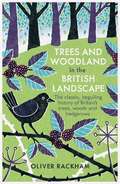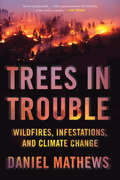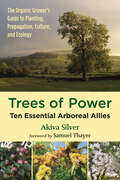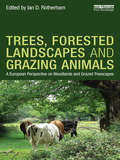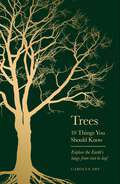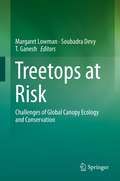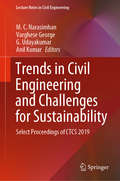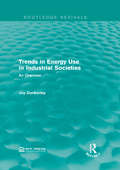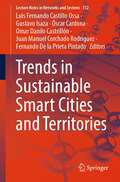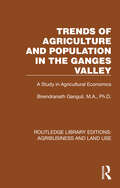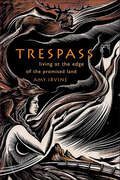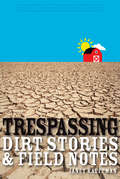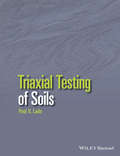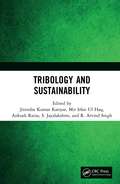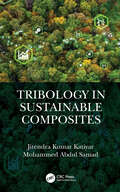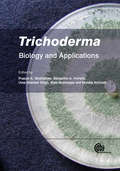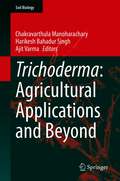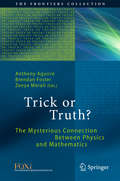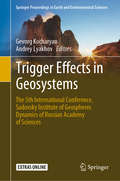- Table View
- List View
Trees and Woodland in the British Landscape
by Dr Oliver RackhamA beautifully written classic of nature writing.'A masterly account...of supreme interest...a classic' Country LifeLong accepted as the best work on the subject, Oliver Rackham's book is both a comprehensive history of Britain's woodland and a field-work guide that presents trees individually and as part of the landscape.From prehistoric times, through the Roman period and into the Middle Ages, Oliver Rackham describes the changing character, role and history of trees and woodland. He concludes this definitive study with a section on the conservation and future of Britain's trees, woodlands and hedgerows.
Trees and Woodland in the British Landscape
by Oliver RackhamA beautifully written classic of nature writing.'A masterly account...of supreme interest...a classic' Country LifeLong accepted as the best work on the subject, Oliver Rackham's book is both a comprehensive history of Britain's woodland and a field-work guide that presents trees individually and as part of the landscape.From prehistoric times, through the Roman period and into the Middle Ages, Oliver Rackham describes the changing character, role and history of trees and woodland. He concludes this definitive study with a section on the conservation and future of Britain's trees, woodlands and hedgerows.
Trees in Nineteenth-Century English Fiction: The Silvicultural Novel (Routledge Environmental Humanities)
by Anna BurtonThis is a book about a longstanding network of writers and writings that celebrate the aesthetic, socio-political, scientific, ecological, geographical, and historical value of trees and tree spaces in the landscape; and it is a study of the effect of this tree-writing upon the novel form in the long nineteenth century. Trees in Nineteenth-Century English Fiction: The Silvicultural Novel identifies the picturesque thinker William Gilpin as a significant influence in this literary and environmental tradition. Remarks on Forest Scenery (1791) is formed by Gilpin’s own observations of trees, forests, and his New Forest home specifically; but it is also the product of tree-stories collected from ‘travellers and historians’ that came before him. This study tracks the impact of this accumulating arboreal discourse upon nineteenth-century environmental writers such as John Claudius Loudon, Jacob George Strutt, William Howitt, and Mary Roberts, and its influence on varied dialogues surrounding natural history, agriculture, landscaping, deforestation, and public health. Building upon this concept of an ongoing silvicultural discussion, the monograph examines how novelists in the realist mode engage with this discourse and use their understanding of arboreal space and its cultural worth in order to transform their own fictional environments. Through their novelistic framing of single trees, clumps, forests, ancient woodlands, and man-made plantations, Jane Austen, Elizabeth Gaskell, and Thomas Hardy feature as authors of particular interest. Collectively, in their environmental representations, these novelists engage with a broad range of silvicultural conversation in their writing of space at the beginning, middle, and end of the nineteenth century. This book will be of great interest to students, researchers, and academics working in the environmental humanities, long nineteenth-century literature, nature writing and environmental literature, environmental history, ecocriticism, and literature and science scholarship.
Trees in Trouble: Wildfires, Infestations, and Climate Change
by Daniel MathewsA troubling story of the devastating and compounding effects of climate change in the Western and Rocky Mountain states, told through in–depth reportage and conversations with ecologists, professional forest managers, park service scientists, burn boss, activists, and more. Climate change manifests in many ways across North America, but few as dramatic as the attacks on our western pine forests. In Trees in Trouble, Daniel Mathews tells the urgent story of this loss, accompanying burn crews and forest ecologists as they study the myriad risk factors and refine techniques for saving this important, limited resource.Mathews transports the reader from the exquisitely aromatic haze of ponderosa and Jeffrey pine groves to the fantastic gnarls and whorls of five–thousand–year–old bristlecone pines, from genetic test nurseries where white pine seedlings are deliberately infected with their mortal enemy to the hottest megafire sites and neighborhoods leveled by fire tornadoes or ember blizzards.Scrupulously researched, Trees in Trouble not only explores the devastating ripple effects of climate change, but also introduces us to the people devoting their lives to saving our forests. Mathews also offers hope: a new approach to managing western pine forests is underway. Trees in Trouble explores how we might succeed in sustaining our forests through the challenging transition to a new environment.
Trees of Power: Ten Essential Arboreal Allies
by Akiva SilverThe organic grower&’s guide to planting, propagation, culture, and ecologyTrees are our allies in healing the world. Partnering with trees allows us to build soil, enhance biodiversity, increase wildlife populations, grow food and medicine, and pull carbon out of the atmosphere, sequestering it in the soil.Trees of Power explains how we can work with these arboreal allies, specifically focusing on propagation, planting, and individual species. Author Akiva Silver is an enthusiastic tree grower with years of experience running his own commercial nursery. In this book he clearly explains the most important concepts necessary for success with perennial woody plants. It&’s broken down into two parts: the first covering concepts and horticultural skills and the second with in-depth information on individual species. You&’ll learn different ways to propagate trees: by seed, grafting, layering, or with cuttings. These time-honored techniques make it easy for anyone to increase their stock of trees, simply and inexpensively.Ten chapters focus on the specific ecology, culture, and uses of different trees, ones that are common to North America and in other temperate parts of the world:Chestnut: The Bread TreeApples: The Magnetic CenterPoplar: The HomemakerAsh: Maker of WoodMulberry: The Giving TreeElderberry: The CaretakerHickory: Pillars of LifeHazelnut: The ProviderBlack Locust: The Restoration TreeBeech: The Root RunnerTrees of Power fills an urgent need for up-to-date information on some of our most important tree species, those that have multiple benefits for humans, animals, and nature. It also provides inspiration for new generations of tree stewards and caretakers who will not only benefit themselves, but leave a lasting legacy for future generations.Trees of Power is for everyone who wants to connect with trees. It is for the survivalist, the gardener, the homesteader, the forager, the permaculturist, the environmentalist, the parent, the schoolteacher, the farmer, and anyone who feels a deep kinship with these magnificent beings.
Trees, Forested Landscapes and Grazing Animals: A European Perspective on Woodlands and Grazed Treescapes
by Ian D. RotherhamIn this comprehensive book, the critical components of the European landscape – forest, parkland, and other grazed landscapes with trees are addressed. The book considers the history of grazed treed landscapes, of large grazing herbivores in Europe, and the implications of the past in shaping our environment today and in the future. Debates on the types of anciently grazed landscapes in Europe, and what they tell us about past and present ecology, have been especially topical and controversial recently. This treatment brings the current discussions and the latest research to a much wider audience. The book breaks new ground in broadening the scope of wood-pasture and woodland research to address sites and ecologies that have previously been overlooked but which hold potential keys to understanding landscape dynamics. Eminent contributors, including Oliver Rackham and Frans Vera, present a text which addresses the importance of history in understanding the past landscape, and the relevance of historical ecology and landscape studies in providing a future vision.
Trees: 10 Things You Should Know
by Carolyn FryDiscover the wonders at the centre of our planet's ecosystem.In ten short and accessible essays, science and nature writer Carolyn Fry takes us on an awe-inspiring journey of the Earth's lungs. From what makes a plant a tree and the incredible impact of forests, to how trees are under attack and what we can do to save them, this book will enthral and inform on the monumental power of the humble tree.Trees: 10 things you should know is an essential introduction to why trees are so important, and why our lives depend on them!
Treetops at Risk: Challenges of Global Canopy Ecology and Conservation
by Margaret Lowman Soubadra Devy T. GaneshForest canopies not only support high terrestrial biodiversity but also represent a critical interface between the atmosphere and the earth. They provide goods and services to support diverse human communities and offer opportunities to explore sustainable use of these resources for many generations of local livelihoods. Forest canopies are important carbon sequestration units, and in this sense, serve as climate control for the planet. Canopies are important energy production centers for the planet, and serve as the basis for many food chains. The canopy can also act as a hook for education outreach and conservation, inspiring ecotourism through recreation and other sustainable uses such as treetop walks, zip lines, and birding. Despite these critical services provided by forest canopies, almost no dedicated research in the treetops was initiated until as recently as the late 1970s when single rope techniques were developed by mountaineering professionals and adapted for use in the canopy. Subsequently, an array of canopy access tools was designed in the 1980s and early 1990s that have opened up this "eighth continent" for global exploration and discovery. This volume uses the major findings of the 5th international canopy conference as a platform for organization, but it does not mimic the sessions and presentations of the conference itself. Instead, it builds on the important themes that emerged from the conference and solicits articles that represent future priorities and advancements for canopy science in the next decade. Despite the global efforts of hundreds of forest scientists over the past 3 decades, forests are degrading at an accelerated rate and biodiversity is increasingly threatened by human activities. Given these trends - despite the very best efforts of the world's best scientists - other approaches must be taken. This volume summarizes the issue of "treetops at risk" and assembles a global authorship to examine past accomplishments and future initiatives critical in forest conservation.
Trends in Civil Engineering and Challenges for Sustainability: Select Proceedings of CTCS 2019 (Lecture Notes in Civil Engineering #99)
by Anil Kumar M. C. Narasimhan Varghese George G. UdayakumarThis book comprises selected papers from the International Conference on Civil Engineering Trends and Challenges for Sustainability (CTCS) 2019. The book presents latest research in several areas of civil engineering such as construction and structural engineering, geotechnical engineering, environmental engineering and sustainability, and geographical information systems. With a special emphasis on sustainable development, the book covers case studies and addresses key challenges in sustainability. The scope of the contents makes the book useful for students, researchers, and professionals interested in sustainable practices in civil engineering.
Trends in Computational Nanomechanics
by Traian DumitricaTrends in Computational Nanomechanics reviews recent advances in analytical and computational modeling frameworks to describe the mechanics of materials on scales ranging from the atomistic, through the microstructure or transitional, and up to the continuum. The book presents new approaches in the theory of nanosystems, recent developments in theoretical and computational methods for studying problems in which multiple length and/or time scales must be simultaneously resolved, as well as example applications in nanomechanics. This title will be a useful tool of reference for professionals, graduates and undergraduates interested in Computational Chemistry and Physics, Materials Science, Nanotechnology.
Trends in Energy Use in Industrial Societies: An Overview (Routledge Revivals)
by Joy DunkerleyTaken from a report for the Electric Power Research Institute, Joy Dunkerley’s study aims to clarify the relationship between energy consumption and economic output in industrialised countries. Originally published in 1980 and using data from 1972, this study uses cross-country comparisons of energy use to stress the importance of new supply options and measures of controlling energy use without affecting living standards whilst also discussing the impact of energy prices and economic growth in the countries studied. This title will be of interest to students of environmental studies.
Trends in Sustainable Smart Cities and Territories (Lecture Notes in Networks and Systems #732)
by Juan Manuel Corchado Rodriguez Gustavo Isaza Luis Fernando Castillo Ossa Óscar Cardona Omar Danilo Castrillón Fernando De la Prieta PintadoThis book presents the latest scientific and technical advances in the fields of Smart Cities and Smart Territories. It shows outcomes of 2nd Sustainable Smart Cities and Territories International Conference in Manizales (Colombia) on June 21–23, 2023. The concept of smart cities, which emerged in the early 2000s, attempts to solve these challenges by implementing information and communication technologies. The initial concept of smart cities focused on the modernization of megacities.
Trends of Agriculture in the Ganges Valley: A Study in Agricultural Economics (Routledge Library Editions: Agribusiness and Land Use #11)
by Birendranath GanguliOriginally published in 1938, this book explores the problem of the adjustment of the population in the early 20th century to the agricultural-economic environment in a geographical and economic setting. The study of the modern problem of population growth is also one of human adjustment in its wider sense to the whole of the environment, which in itself is an ensemble of various interdependent factors. The study is based on a classification of agricultural regions in the Ganges Valley which shows some of the world’s highest records of agricultural productivity.
Trespass: Living at the Edge of the Promised Land
by Amy IrvineTrespass is the story of one woman's struggle to gain footing in inhospitable territory. A wilderness activist and apostate Mormon, Amy Irvine sought respite in the desert outback of southern Utah's red-rock country after her father's suicide, only to find out just how much of an interloper she was among her own people. But more than simply an exploration of personal loss, Trespass is an elegy for a dying world, for the ruin of one of our most beloved and unique desert landscapes and for our vanishing connection to it. Fearing what her father's fate might somehow portend for her, Irvine retreated into the remote recesses of the Colorado Plateau—home not only to the world's most renowned national parks but also to a rugged brand of cowboy Mormonism that stands in defiant contrast to the world at large. Her story is one of ruin and restoration, of learning to live among people who fear the wilderness the way they fear the devil and how that fear fuels an antagonism toward environmental concerns that pervades the region. At the same time, Irvine mourns her own loss of wildness and disconnection from spirituality, while ultimately discovering that the provinces of nature and faith are not as distinct as she once might have believed.
Trespassing Across America: One Man's Epic, Never-Done-Before (and Sort of Illegal) Hike Across the Heartland
by Ken IlgunasTold with sincerity, humor, and wit, Trespassing Across America is both a fascinating account of one man's remarkable journey along the Keystone XL pipeline and a meditation on climate change, the beauty of the natural world, and the extremes to which we can push ourselves--both physically and mentally. It started as a far-fetched idea--to hike the entire length of the proposed route of the Keystone XL pipeline. But in the months that followed, it grew into something more for Ken Ilgunas. It became an irresistible adventure--an opportunity not only to draw attention to global warming but also to explore his personal limits. So in September 2012, he strapped on his backpack, stuck out his thumb on the interstate just north of Denver, and hitchhiked 1,500 miles to the Alberta tar sands. Once there, he turned around and began his 1,700-mile trek to the XL's endpoint on the Gulf Coast of Texas, a journey he would complete entirely on foot, walking almost exclusively across private property.Both a travel memoir and a reflection on climate change, Trespassing Across America is filled with colorful characters, harrowing physical trials, and strange encounters with the weather, terrain, and animals of America's plains. A tribute to the Great Plains and the people who live there, Ilgunas's memoir grapples with difficult questions about our place in the world: What is our personal responsibility as stewards of the land? As members of a rapidly warming planet? As mere individuals up against something as powerful as the fossil fuel industry? Ultimately, Trespassing Across America is a call to embrace the belief that a life lived not half wild is a life only half lived.
Trespassing: Dirt Stories and Field Notes
by Janet KauffmanEssays and stories that contemplate the exploitation of Michigan's agricultural landscape by modern factory farms.
Triaxial Testing of Soils
by Poul V. LadeTriaxial Testing of Soils explains how to carry out triaxial tests to demonstrate the effects of soil behaviour on engineering designs. An authoritative and comprehensive manual, it reflects current best practice and instrumentation.References are made throughout to easily accessible articles in the literature and the book?s focus is on how to obtain high quality experimental results.
Tribology and Sustainability
by S. Jayalakshmi R. Arvind Singh Jitendra Kumar Katiyar Ankush Raina Mir Irfan Ul HaqTribology and Sustainability brings a vision of promoting a greener, cleaner and eco-friendly environment by highlighting sustainable solutions in tribology via the development of self-lubricating materials, green additives in lubricants, natural fibre-reinforced materials and biomimetic approaches. Backed by supporting schematic diagrams, data tables and illustrations for easy understanding, the book focuses on recent advancements in tribology and sustainability. Global sustainability and regional requirements are addressed through chapters on natural composites, green lubricants, biomedical systems and wind energy systems, with a dedicated chapter on a global sustainability scenario. FEATURES Highlights sustainability via new tribological approaches and how such methods are essential Covers the theoretical aspects of various tribological topics concerning mechanical and material designs for energy-efficient systems Includes practical global sustainability based on the regional requirements of tribological research and sustainable impact Reviews the tribology of green lubricants, green additives and lightweight materials Discusses topics related to biomimetics and biotribology Tribology and Sustainability will assist researchers, professionals and graduate students in tribology, surface engineering, mechanical design and materials engineering, including mechanical, aerospace, chemical and environmental engineering.
Tribology in Sustainable Composites
by Jitendra Kumar Katiyar Mohammed Abdul SamadTribological performance of sustainable composites depend upon external parameters such as interface and environmental temperature, contact pressure and behavior of contact materials at interface and so forth. This book covers sustainable composites and bio- composites in terms of proper selection of reinforcements, methods to improve the thermal and mechanical properties, techniques for uniform dispersion of the reinforcements and their tribological performance. Also, it details the testing and damage characterization methods of these sustainable composites. Features: 1. Presents fundamental knowledge of sustainable composites, including chemical composition, structural features and fabrication techniques. 2. Provides an analytical overview of the different types of characterization techniques and tribological methods. 3. Provides an extensive review on bio- composite properties and their tribological performance for biomedical application. 4. Contains extensive reviews on cutting- edge research on lightweight materials for future applications in a variety of industries and their tribological performance. 5. Provides the application of sustainable composites in various fields such as aerospace, automobile, medical etc. This book is aimed for Researchers, Professionals and Graduate students of Tribology, Composites, Mechanical Engineering and Materials Engineering.
Trichoderma
by Claire Sallenave-Namont Idit Kosti Richard J Weld Fabian Glaser Yves Francois Pouchus Walter M Jaklitsch Csaba Vagvolgyi Charles M Kenerley Astrid R Mach-Aigner Lea Atanasova David Laughlin Hexon Angel Contreras-Cornejo Yariv Brotman Nicolas Ruiz Rainer Schuhmacher Laszlo Manczinger Catherine Roullier B A Horwitz Susanne Zeilinger Rita Gorsche Karina Petit R L Melnick Johanna M Steyaert Sue Karagiosis Artemio Mendoza-Mendoza Mala Mukherjee Sergio Casas-Flores Bryan A Bailey U S Singh Najam S Zaidi Ludovit Varecka Walter A Vargas Matthias G Steiger Robert L Mach Jose Lopez-Bucio Randy Ortiz-Castro Oliver Grovel Monika Schmoll Laszlo Kredics Prasun K Mukherjee Svetlana Kryštofová Martin Simkovic Lorant Hatvani Alison Stewart Irina S Druzhinina Scott E Baker Alfredo Herrera-EstrellaTrichoderma spp. are biotechnologically significant fungi, being widely used both in agriculture and industry. These microbes are also a potential drug source of clinical importance. In recent years, driven by advances in genetics and genomics, research on these fungi have opened new avenues for its varied applications. Divided into three sections, covering taxonomy and physiology, interactions with plants and applications and significance, this book also discusses topics that have seen rapid developments in the recent years. Various aspects of Trichoderma like molecular taxonomy, sexual and asexual developments, secondary metabolism, beneficial interactions with plants, applications as cell factories and harmful interactions with humans are discussed. This book, thus, hopes to be an essential ready reference for researchers, students and people form industry as well.
Trichoderma: Agricultural Applications and Beyond (Soil Biology #61)
by Ajit Varma Harikesh Bahadur Singh Chakravarthula ManoharacharyThis book gives a comprehensive overview on the various aspects of Trichoderma, a filamentous fungus ubiquitously present in soil. Topics addressed are the biology, diversity, taxonomy, ecology, biotechnology and cultivation of Trichoderma, to just name a few. Basic as well as applied aspects are covered and a special focus is given on use of Trichoderma in agriculture and beyond. Trichoderma species are widely distributed throughout the world in soil, rotting plant material, and wood. Although they are often considered as a contaminants, Trichoderma species are also known for their ability to act as biocontrol agents against various plant pathogens and plant diseases, and also as biostimulants promoting plant growth. The contents of this book will be of particular interest to, agricultural scientists, biotechnologists, plant pathologists, mycologists, and microbiologists, students, extension workers, policy makers and other stakeholders.
Trichoderma: Biology and Applications
by Claire Sallenave-Namont Idit Kosti Richard J Weld Fabian Glaser Yves Francois Pouchus Walter M Jaklitsch Csaba Vagvolgyi Charles M Kenerley Astrid R Mach-Aigner Lea Atanasova David Laughlin Hexon Angel Contreras-Cornejo Yariv Brotman Nicolas Ruiz Rainer Schuhmacher Laszlo Manczinger Catherine Roullier B A Horwitz Susanne Zeilinger Rita Gorsche Karina Petit R L Melnick Sue Karagiosis Artemio Mendoza-Mendoza Mala Mukherjee Sergio Casas-Flores Bryan A Bailey U S Singh Najam S Zaidi Ludovit Varecka Walter A Vargas Matthias G Steiger Robert L Mach Jose Lopez-Bucio Randy Ortiz-Castro Oliver Grovel Monika Schmoll Laszlo Kredics Prasun K Mukherjee Svetlana Kryštofová Martin Simkovic Lorant Hatvani Alison Stewart Irina S Druzhinina Scott E Baker Alfredo Herrera-Estrella Johanna SteyaertTrichoderma spp. are biotechnologically significant fungi, being widely used both in agriculture and industry. These microbes are also a potential drug source of clinical importance. In recent years, driven by advances in genetics and genomics, research on these fungi have opened new avenues for its varied applications. Divided into three sections, covering taxonomy and physiology, interactions with plants and applications and significance, this book also discusses topics that have seen rapid developments in the recent years. Various aspects of Trichoderma like molecular taxonomy, sexual and asexual developments, secondary metabolism, beneficial interactions with plants, applications as cell factories and harmful interactions with humans are discussed. This book, thus, hopes to be an essential ready reference for researchers, students and people form industry as well.
Trick or Truth?
by Anthony Aguirre Brendan Foster Zeeya MeraliThe prize-winning essays in thisbook address the fascinating but sometimes uncomfortable relationship betweenphysics and mathematics. Ismathematics merely another natural science? Or is it the result of humancreativity? Does physics simply wear mathematics like a costume, or is math thelifeblood of physical reality? The nineteen wide-ranging, highly imaginative and oftenentertaining essays are enhanced versions of the prize-winning entries to theFQXi essay competition "Trick or Truth", which attracted over 200 submissions. The Foundational QuestionsInstitute, FQXi, catalyzes, supports, and disseminates research on questions atthe foundations of physics and cosmology, particularly new frontiers andinnovative ideas integral to a deep understanding of reality, but unlikely tobe supported by conventional funding sources.
Trigger Effects in Geosystems: The 5th International Conference, Sadovsky Institute of Geospheres Dynamics of Russian Academy of Sciences (Springer Proceedings in Earth and Environmental Sciences)
by Gevorg Kocharyan Andrey LyakhovThis book is the result of collaboration within the frames of the 5th International Conference "Trigger Effects in Geosystems" held in the Institute of Geosphere Dynamics of Russian Academy of Sciences, June 2019. This book aims to raise awareness about different triggering aspects in the geosphere and its effects.The conference provided a multidisciplinary platform with a focus on (i) the influence of natural and anthropogenic factors on the geosphere, geomechanical systems and anthropogenic objects found in a subcritical state and (ii) the influence of these factors on the system “atmosphere - ionosphere”.The problems considered in the book may be interesting for a wide audience including students, professionals, researches, and for the industry.
Triple Oxygen Isotopes (Elements in Geochemical Tracers in Earth System Science)
by Huiming BaoThe 'detective' power of stable isotopes for processes that occurred in the past, and for elucidating mechanisms at the molecular level, has impressed researchers over the past 100 years, since the time when isotopes of elements were first discovered. While most are interested in the normalized abundance ratios of two isotopes of an element, further power was unleashed when researchers investigated the relationship of three or more isotopes of the same element, e.g. 16O, 17O, and 18O for oxygen. This Element focuses on the history of discovery of triple isotope effects, the conceptual framework behind these effects, and major lines of development in the past few years of triple oxygen isotope research.
